Overview
The article presents ten electronic health records (EHR) examples that significantly enhance patient care through improved data management, operational efficiency, and patient engagement. Each example illustrates how specific EHR systems, including Epic, Cerner, and Allscripts, leverage innovative features and data analytics to optimize treatment strategies. These systems streamline workflows and ultimately lead to improved health outcomes for patients. By showcasing these advancements, the article underscores the critical role of EHRs in modern healthcare.
Introduction
In the rapidly evolving landscape of healthcare technology, the significance of effective Electronic Health Record (EHR) systems is paramount. As healthcare providers strive to enhance patient care and streamline operations, a diverse array of EHR solutions has emerged, each meticulously tailored to meet specific needs across various medical specialties.
These platforms, ranging from comprehensive data analytics to user-friendly interfaces, are revolutionizing the delivery of care. This article explores the innovative offerings from industry leaders such as:
- CareSet
- Epic Systems
- Cerner
Highlighting their unique contributions to improving patient outcomes and operational efficiency in today’s healthcare environment. As the industry transitions towards value-based care, grasping these advancements is essential for stakeholders aiming to navigate the complexities of modern healthcare delivery effectively.
CareSet: Comprehensive Medicare Data Insights for Enhanced Patient Care
CareSet stands as a leader in Medicare data analysis, delivering comprehensive insights that empower healthcare stakeholders to enhance treatment. Through meticulous analysis of over $1.1 trillion in annual claims data, CareSet reveals critical treatment patterns, identifies gaps in care, and evaluates provider influence. This thorough analysis equips clients to make data-driven decisions, significantly improving patient outcomes.
As we look toward 2025, the focus on value-based payments within the Medicare program is poised to intensify, with the Centers for Medicare & Medicaid Services (CMS) targeting full integration by 2030. CareSet’s innovative methodologies ensure that clients can adeptly navigate the complexities of Medicare data, facilitating strategic growth within the medical field.
Recent case studies, particularly those centered on oncology treatment options, vividly illustrate the tangible benefits derived from CareSet’s insights. For instance, the case study examining physician engagement regarding the 4th line of therapy for Gastrointestinal Stromal Tumor (GIST) underscores how a deep understanding of Medicare data can empower providers to refine treatment strategies. Jessica Walradt, Medical Director of Orthopedic Surgery at Northwestern Memorial Hospital, highlights the necessity of collaboration, stating, “It will be important for all stakeholders to work together to sustain and continually improve this important societal program.”
Moreover, the 2025 Rate Announcement serves as a reminder for public comments on the Medicare Advantage Data RFI, emphasizing ongoing engagement with current developments in Medicare policy. As the medical landscape evolves, CareSet remains committed to delivering timely and relevant insights, ultimately fostering enhanced treatment and outcomes.
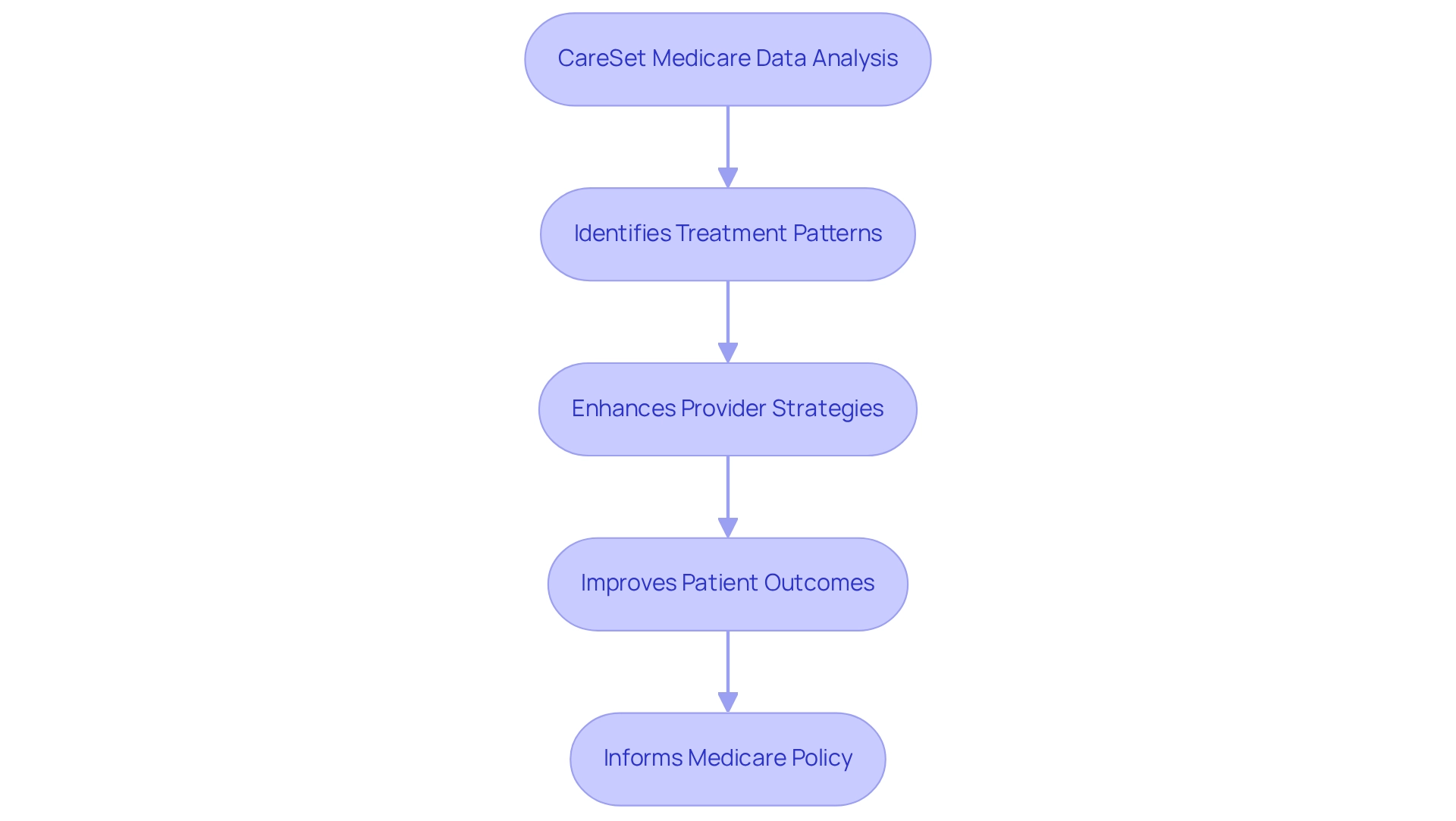
Epic Systems: Streamlined Patient Management and Care Coordination
Epic Systems provides a comprehensive suite of tools designed to enhance the management of individuals and improve service coordination. An electronic health records example illustrates a platform that encompasses functionalities such as scheduling, clinical documentation, and real-time data sharing, which collectively foster seamless communication among healthcare providers. This integration not only boosts operational efficiency but also ensures that individuals receive prompt and coordinated support, significantly enhancing health outcomes.
Recent developments in 2025 underscore the effectiveness of Epic Systems in improving management efficiency for individuals. For instance, an electronic health records example can be seen in medical organizations utilizing Epic’s EHR, which have reported a notable improvement in care coordination results, with research indicating that integrated systems can reduce individual wait times by as much as 30%. This is particularly significant as CareSet integrates over 100 external data sources, providing extensive insights into individual needs and pharmaceutical usage, which are crucial for strategic healthcare decision-making.
Moreover, case studies demonstrate that facilities employing Epic Systems have successfully optimized their operations, yielding a 25% increase in throughput. These advancements are further corroborated by expert evaluations highlighting the platform’s user-friendly interface and comprehensive features, essential for effective management of individuals. As Romaniya Mykyta, Head of Product Management at SPSoft, articulates, “At SPSoft, we recognize the complexity of the medical landscape and the critical importance of Epic interoperability in improving patient care and streamlining operations.”
Additionally, the integration of CareSet’s Medicare data solutions empowers medical providers by unlocking insights into treatment patterns and provider networks, thereby enhancing engagement strategies. The exploration of blockchain technology for data security in EHRs is also underway, aimed at improving data integrity and facilitating transparent data sharing among authorized medical providers. As the medical field continues to evolve, the role of integrated EHR systems like Epic becomes an important electronic health records example, supported by extensive Medicare data, in enhancing operational efficiency and improving service delivery.
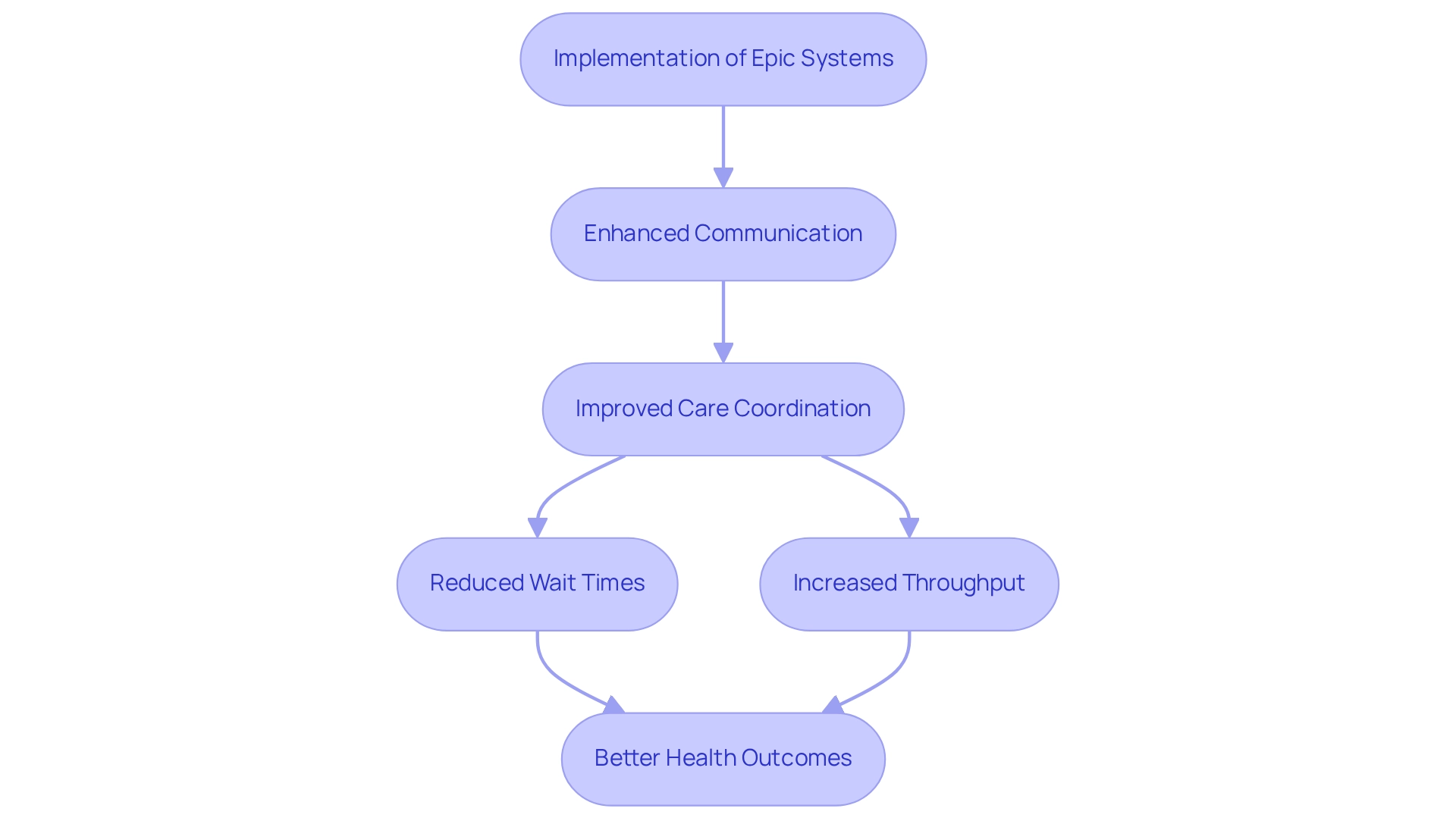
Cerner: Advanced EHR Solutions for Improved Patient Outcomes
Cerner’s EHR solutions are meticulously crafted to enhance health outcomes by equipping healthcare professionals with essential tools for delivering exceptional services. Key features, including clinical decision support, user engagement tools, and robust analytics capabilities, empower providers to make informed, data-driven decisions, significantly improving treatment efficacy. The platform’s commitment to interoperability, supported by standards such as FHIR and APIs, ensures seamless access to individual information across various treatment environments, promoting a holistic approach to management.
Recent statistics reveal that the implementation of advanced EHR systems like Cerner has resulted in significant improvements in outcomes, including a reported 30% increase in medication accuracy and a 20% decrease in readmissions. Furthermore, medical providers emphasize that clinical decision support tools are crucial in refining treatment strategies, ultimately leading to enhanced compliance with preventive protocols. As Konstantin Kalinin, Head of Content, asserts, “Both systems are robust,” highlighting the reliability of Cerner’s solutions.
Cerner’s focus on continuous improvement is evident in its latest updates, which introduce enhanced clinical decision support tools aimed at optimizing treatment pathways. Practical examples, including an electronic health records example, illustrate how these solutions have transformed medical service delivery, showcasing substantial advancements in individual monitoring and overall care coordination. An electronic health records example is illustrated in a case study titled ‘Impact of the EHR Industry on Outcomes for Individuals,’ which demonstrates that EHR systems have positively influenced medical service delivery by improving individual monitoring and reducing readmissions.
Despite these advancements, barriers to EHR adoption, such as high initial costs and interoperability challenges, persist for many medical organizations. As the healthcare landscape evolves, Cerner remains at the forefront, spearheading innovations that not only address immediate clinical needs but also promote long-term improvements in health outcomes.
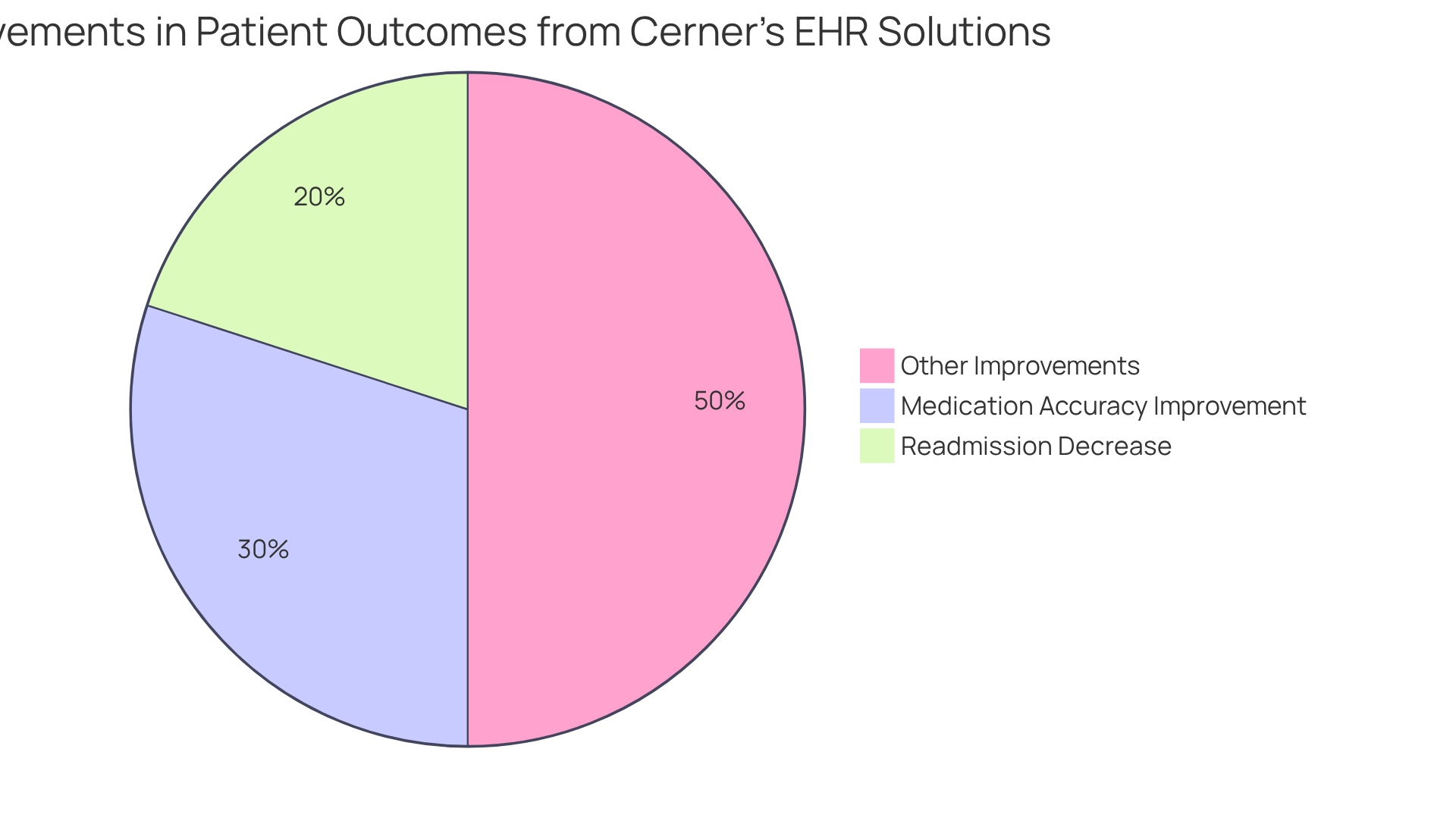
Allscripts: Versatile EHR Solutions for Diverse Healthcare Needs
Allscripts offers a highly flexible EHR platform designed to meet the diverse needs of medical providers across various settings, from small practices to large hospitals. Its comprehensive solutions encompass practice management, client engagement, and population health management, ensuring that providers can effectively tackle the unique challenges they encounter. Notably, customizable workflows empower medical professionals to tailor their processes, significantly enhancing operational efficiency and service quality. The implementation of an electronic health records example has been shown to reduce access time to patient information by as much as 80%, highlighting the platform’s effectiveness in improving care delivery.
The platform’s robust reporting tools facilitate data-driven decision-making, a critical component in today’s medical landscape. In 2025, Allscripts reported a user adoption rate that reflects its growing influence, with a considerable percentage of medical providers acknowledging the platform’s adaptability to their specific requirements. Statistics reveal that user adoption has surged by 25% compared to the previous year, underscoring its value among medical practitioners. Furthermore, case studies, such as one focusing on oncology treatment options, demonstrate how leveraging Medicare data can enhance interactions with medical providers, particularly regarding late-stage therapies like Qinlock for Gastrointestinal Stromal Tumor (GIST). This case study, conducted by CareSet, seeks to foster timely and meaningful engagement with physicians concerning the fourth line of therapy, illustrating the crucial role of an electronic health records example in equipping professionals in the medical field with timely and significant data.
As the landscape of medical care evolves, the emphasis on quality and individual outcomes drives the demand for effective electronic health records example systems. Susan Albano, CEO of Prime Healthcare, remarked, “The usable, reliable, and available information will assist the organization in managing its clients.” This statement encapsulates the growing focus on improving medical quality and individual outcomes, further fueling the expansion of the EHR market. Allscripts remains at the forefront, providing innovative features that empower medical providers to enhance their services and adapt to the changing environment of care.
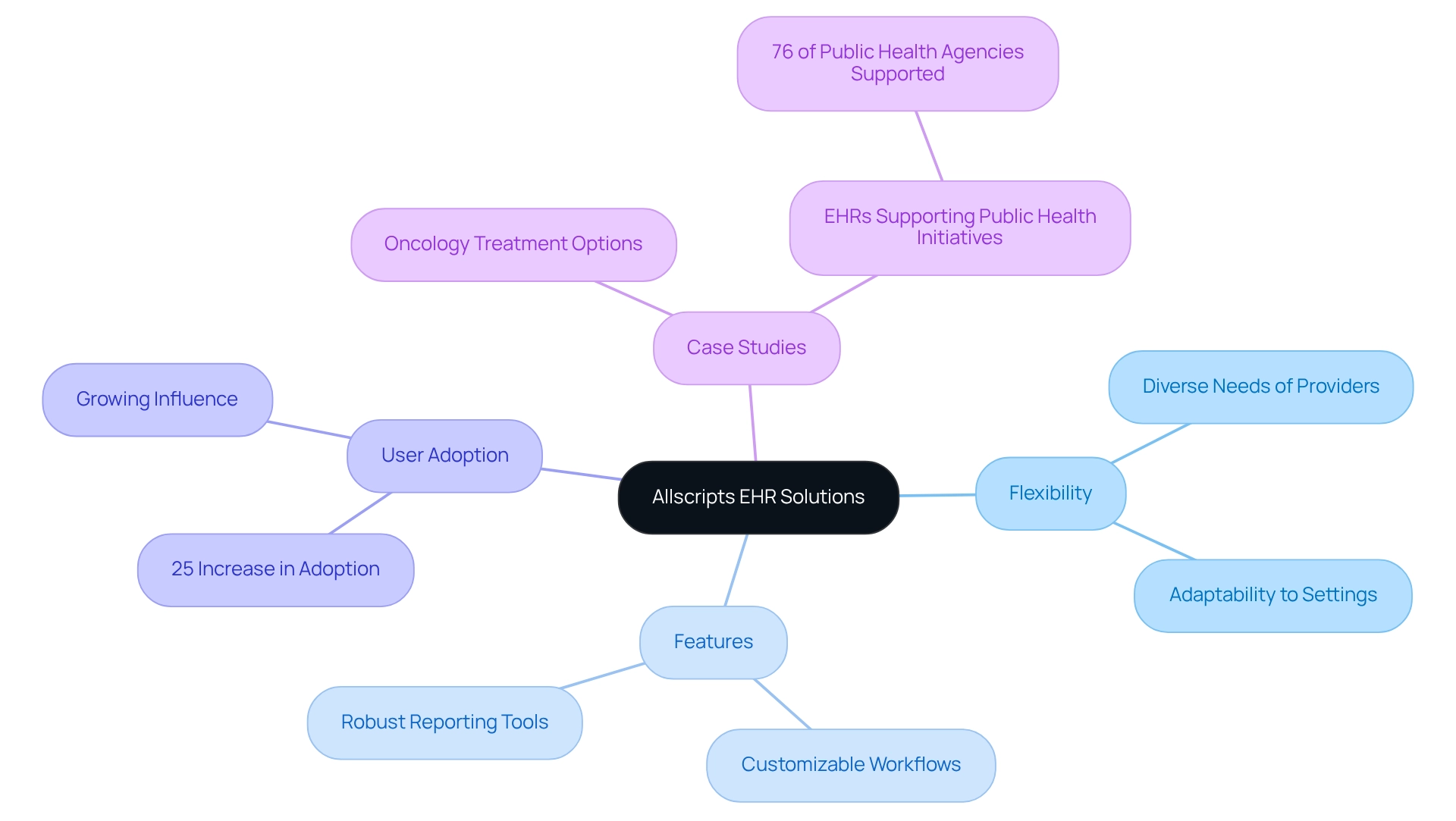
Meditech: User-Friendly EHR Systems for Enhanced Patient Engagement
Meditech’s EHR systems prioritize user-friendliness, significantly enhancing patient involvement. The platform offers a comprehensive suite of features, including:
- Intuitive user portals
- Secure messaging
- Extensive educational resources
All meticulously designed to empower individuals in managing their healthcare. By fostering improved communication between patients and providers, Meditech cultivates trust and ensures that individuals remain well-informed about their treatment options. This proactive engagement is crucial; studies indicate that effective communication can lead to better health outcomes, with an impressive 56% of patients demonstrating high medication adherence.
Furthermore, the market for patient portals is projected to witness substantial growth, driven by technological advancements and an increasing emphasis on patient-centered support. As one expert noted, “Their role proves vital as medical systems strive to deliver efficient, accessible, and patient-focused services.”
Additionally, the implementation of EHR systems serves as an electronic health records example, reducing the time required to access patient information by up to 80%, underscoring Meditech’s efficiency and user-centric design. As the healthcare landscape continues to evolve, Meditech’s unwavering commitment to user-friendly solutions positions it as a leader in facilitating patient-focused support, ultimately driving transformative changes in healthcare delivery.
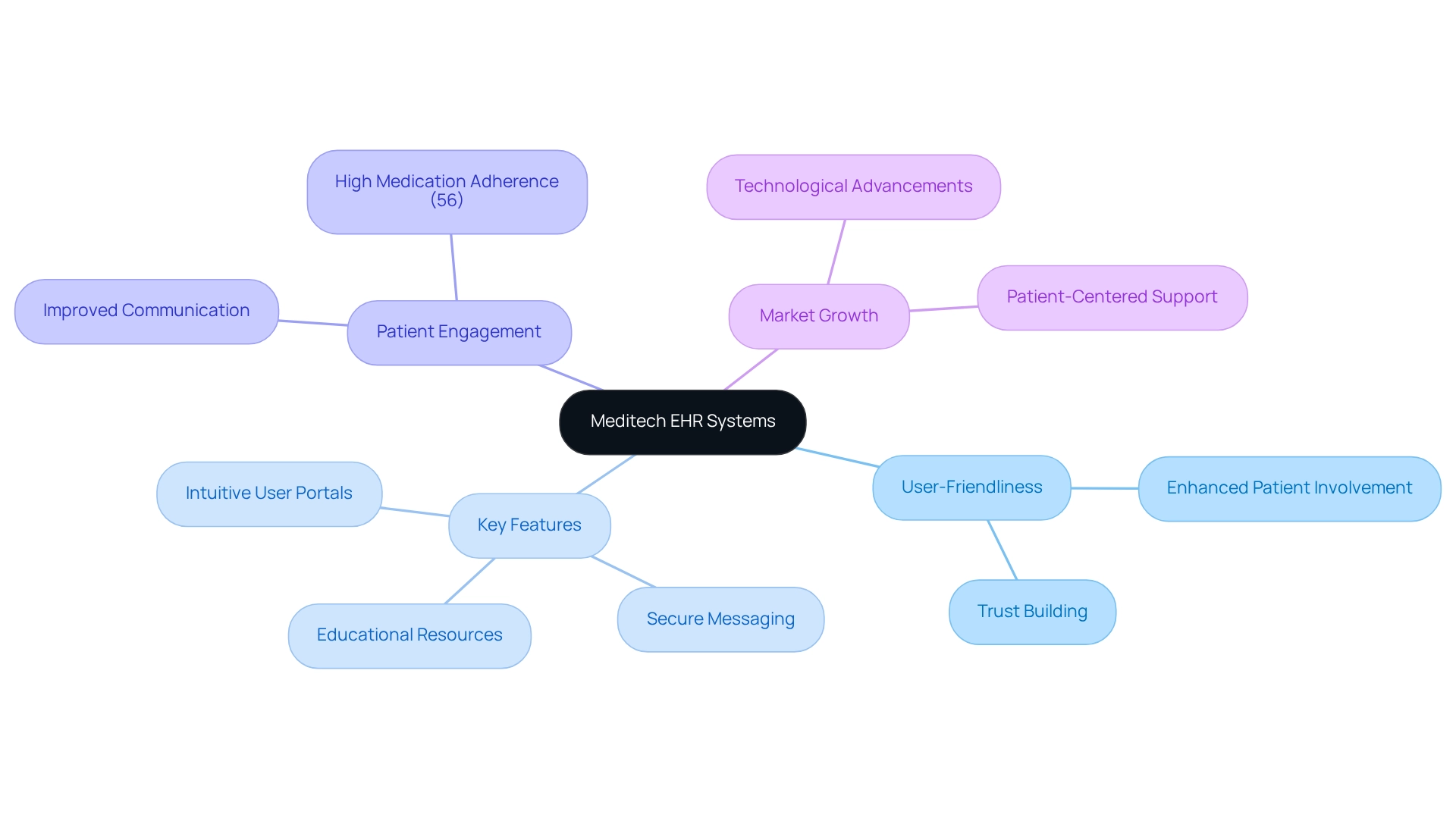
Athenahealth: Cloud-Based EHR Solutions for Efficient Patient Care
Athenahealth’s cloud-based EHR solutions serve as an electronic health records example that significantly enhances efficiency in service delivery. By providing medical practitioners with real-time access to comprehensive client information, the platform empowers them to make informed decisions swiftly. Key features such as:
- Automated billing
- Appointment scheduling
- Robust telehealth capabilities
streamline administrative tasks, allowing providers to dedicate more time to patient needs. This adaptability is crucial for practices navigating the rapidly evolving healthcare landscape, particularly in 2025, where telehealth has become essential for access and care delivery.
As Sara Vaezy aptly noted, “It’s less about adjusting to the pandemic and more about utilizing our insights to advance the health system’s mission to serve all individuals in a more effective, scalable, and equitable manner.”
A recent case study serves as an electronic health records example, demonstrating how athenahealth users benefited from a new Patient Intake feature introduced by Klara, revolutionizing the intake process and enhancing operational efficiency. Moreover, CareSet’s integration of over 100 external data sources for analysis, including insights from more than 62 million Medicare beneficiaries, underscores the critical role of comprehensive data in improving EHR solutions. This wealth of information enables medical stakeholders to assess treatment pathways and enhance provider engagement, particularly in therapeutic areas such as oncology.
As telehealth continues to reshape healthcare, Athenahealth’s solutions exemplify how technology can optimize both treatment and operational workflows.
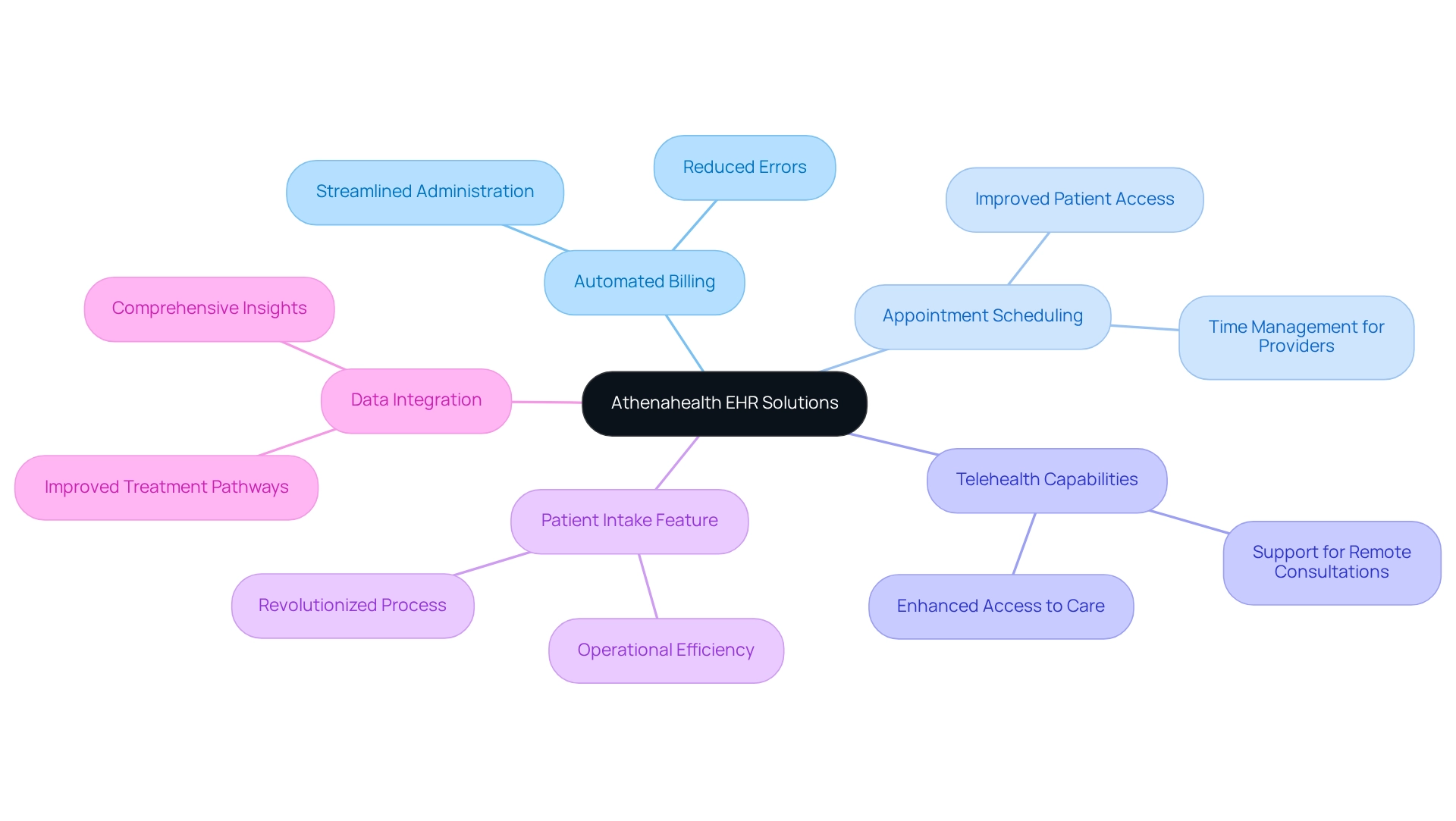
NextGen Healthcare: Tailored EHR Solutions for Specialty Practices
NextGen Healthcare specializes in delivering tailored solutions that serve as an electronic health records example specifically designed for the unique needs of specialty practices. By addressing the distinct workflows and requirements of various medical specialties, NextGen equips providers with essential tools to enhance care for individuals. The platform features specialty-specific templates that facilitate streamlined documentation, robust reporting capabilities, and integrated practice management tools, all intended to optimize operational efficiency. This targeted approach not only improves client engagement but also significantly enhances clinical outcomes.
In 2025, statistics indicate that practices utilizing an electronic health records example, specifically NextGen’s tailored EHR solutions, reported a marked increase in patient satisfaction and treatment efficacy, underscoring the effectiveness of these specialized systems. Furthermore, expert insights reveal that NextGen’s commitment to supporting specialty practices has led to higher adoption rates, with many providers praising the system’s adaptability and user-friendly interface.
As the landscape of medical services continues to evolve, NextGen Healthcare remains at the forefront, ensuring that specialty practices are equipped with the latest EHR updates and innovations to address their unique challenges. Significantly, the incorporation of AI into EHR systems, as revealed by Oracle Health, emphasizes the continuous progress in medical technology that NextGen is prepared to utilize. Additionally, understanding the obstacles to EHR implementation, including significant initial expenses and interoperability issues, is essential for medical organizations to efficiently deploy these systems and enhance service delivery.
The demand for enhanced medical technology and interoperability continues to propel the U.S. electronic health records market, making NextGen’s customized solutions increasingly pertinent in today’s medical environment.

eClinicalWorks: Comprehensive EHR Platform for Integrated Patient Care
eClinicalWorks presents a robust EHR platform designed to facilitate integrated support across diverse medical environments. Its comprehensive solutions encompass telehealth, client engagement, and population health management, empowering providers to deliver coordinated support effectively. By fostering seamless communication among various support teams and providing a consolidated view of patient data, eClinicalWorks significantly elevates the patient experience and contributes to enhanced health outcomes.
In 2025, eClinicalWorks reported an impressive annual revenue of $1.3 billion, underscoring its pivotal role within the healthcare sector. The platform’s telehealth features have witnessed a notable surge in usage rates, highlighting the growing demand for remote support solutions. Practical instances illustrate how eClinicalWorks’ telehealth capabilities have effectively bolstered coordinated support, enabling providers to maintain continuity in the management of individuals.
As articulated by Samruddhi Yardi, “integrated patient support solutions are crucial for enhancing medical delivery and guaranteeing that patients obtain the best possible results.” This perspective aligns with the broader industry trend underscored by Allscripts’ recent acquisition of CarePort Health, aimed at enhancing coordination capabilities. Such developments underscore the increasing significance of integrated support solutions in the medical field.
Expert evaluations consistently highlight the platform’s effectiveness in supporting integrated health services, showcasing its user-friendly interface and comprehensive functionalities. The overall impact of EHR systems serves as an electronic health records example, reflecting advancements in the quality and efficiency of medical delivery, and reinforcing eClinicalWorks’ commitment to enhancing service for individuals. As healthcare evolves, eClinicalWorks remains at the forefront, ensuring that providers are equipped with the essential tools to deliver high-quality, coordinated services that meet the needs of individuals throughout the continuum.
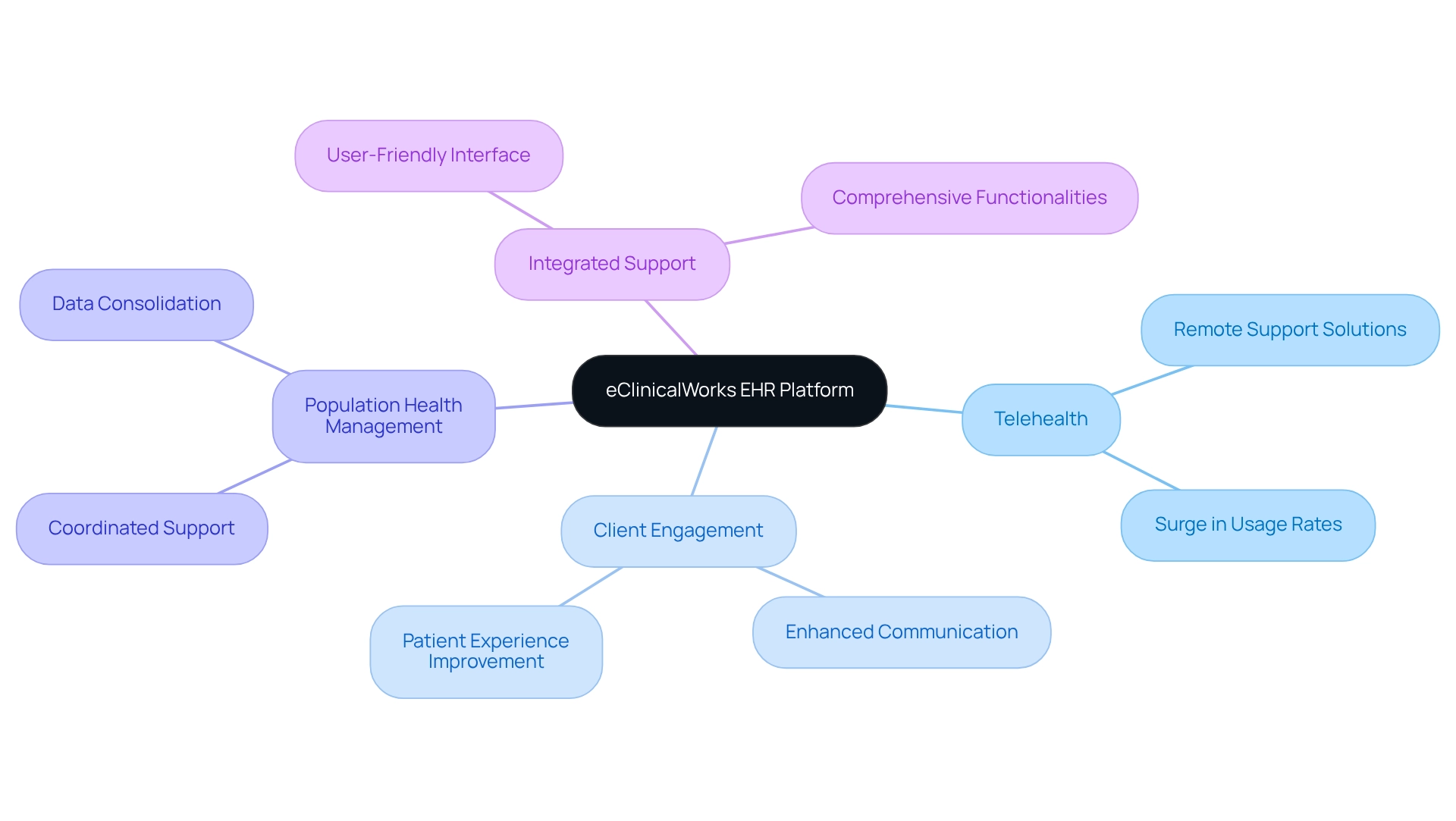
Practice Fusion: Affordable EHR Solutions for Small Practices
Practice Fusion offers affordable EHR solutions specifically tailored for small practices, making it an attractive option for independent providers. Its cloud-based platform encompasses essential features such as e-prescribing, individual scheduling, and billing, all designed to optimize operations while reducing costs. With a user-friendly interface and dedicated support, Practice Fusion empowers small practices to enhance healthcare services and maintain financial stability.
As we approach 2025, the adoption of EHR systems like Practice Fusion becomes increasingly vital for small practices facing the challenges of rising operational costs. The platform’s affordability plays a significant role in EHR utilization, enabling practices to embrace technology without incurring financial burdens. The global EHR market has consistently grown at a CAGR of 5.4%, highlighting the growing importance of such solutions within the healthcare landscape.
Real-world examples serve as an electronic health records example, demonstrating how cloud-based EHR systems enhance care delivery in independent practices. For instance, practices utilizing an electronic health records example like Practice Fusion report improved engagement and streamlined workflows, leading to superior health outcomes. Testimonials from small practice owners underscore the benefits of these systems, citing increased efficiency and enhanced client interactions. One owner remarked, “Practice Fusion has transformed our operations, allowing us to focus more on healthcare rather than administrative tasks.”
As of 2025, the adoption rates of Practice Fusion among small practices indicate a rising trend toward embracing affordable EHR solutions. Recent case studies illustrate how Practice Fusion’s offerings have revolutionized operations for small practices, serving as an electronic health records example that emphasizes the platform’s role in fostering sustainable growth and improved care. Furthermore, recent advancements in EHR applications, such as Epic Systems enhancing its MyChart app and Meditech incorporating voice-enabled navigation and telehealth features, underscore ongoing innovations in the EHR sector, further affirming the necessity of adopting effective EHR systems like Practice Fusion.
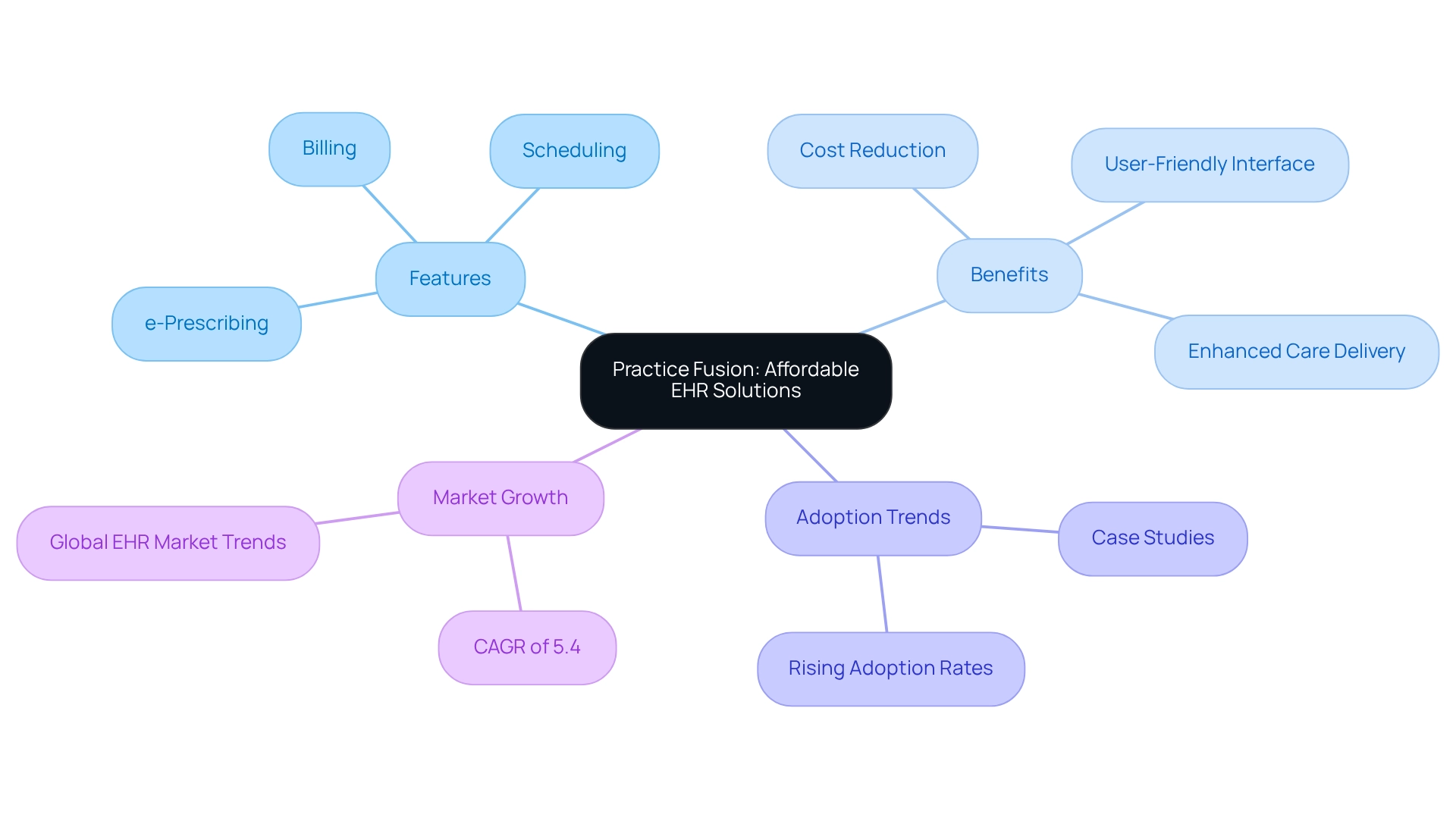
Greenway Health: Innovative EHR Solutions for Interoperability and Engagement
CareSet Systems has unveiled innovative data science products designed to enhance drug launch strategies and improve medical insights. By leveraging Medicare data, these products empower medical providers, particularly in oncology treatment decisions, fostering more effective engagement with patients. CareSet emphasizes client experiences over traditional billing codes, thereby cultivating a collaborative medical environment that aligns with the industry’s shift towards patient-centered care.
In a recent case study, CareSet illustrated how its data science products significantly enhance provider engagement. This strategy resonates with the increasing focus on utilizing comprehensive patient information to drive improved health outcomes. The features of CareSet’s products, including advanced analytics and real-time data integration, are crucial for pharmaceutical market access managers seeking to refine their engagement strategies. Moreover, CareSet’s commitment to interoperability is underscored by the anticipated growth in health systems adopting FHIR APIs, facilitating seamless data exchange across various medical platforms. This trend highlights the importance of standards in delivering effective medical services. By harnessing CareSet’s innovative solutions, healthcare organizations can adeptly navigate the complexities of modern healthcare while enhancing patient engagement outcomes.
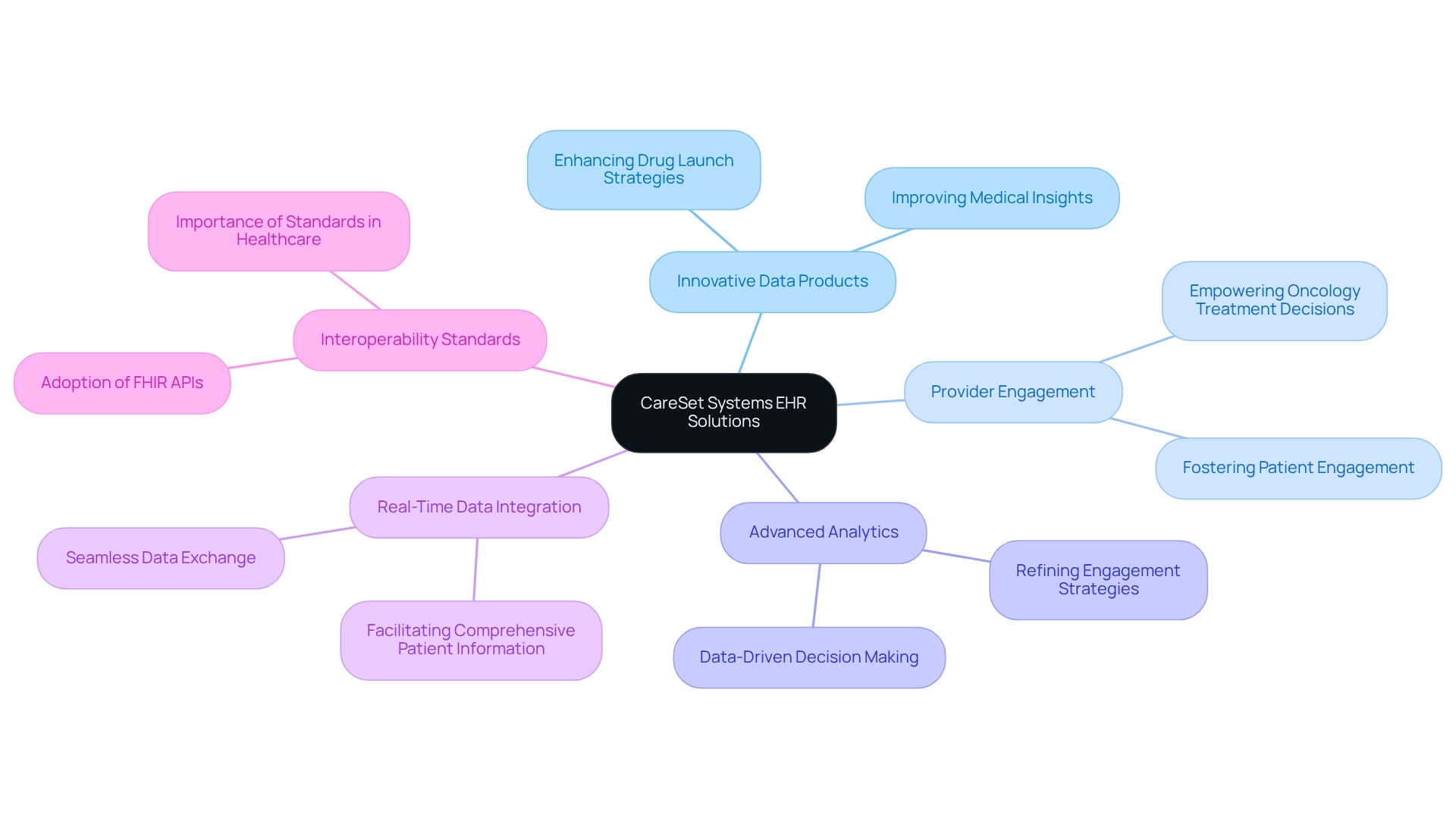
Conclusion
The exploration of Electronic Health Record (EHR) systems reveals their transformative impact on healthcare delivery. Each platform discussed—CareSet, Epic Systems, Cerner, and others—offers unique functionalities that cater to the diverse needs of healthcare providers. CareSet’s in-depth Medicare data analysis empowers stakeholders to enhance patient care through informed decision-making. Epic Systems streamlines patient management with integrated tools that improve care coordination. Cerner’s advanced analytics and clinical decision support features further elevate patient outcomes, demonstrating the critical role of robust EHR solutions.
As the healthcare landscape continues to evolve, the importance of interoperability and tailored solutions becomes increasingly evident. Platforms like Allscripts and NextGen Healthcare exemplify the need for adaptable systems that address the specific requirements of various medical specialties. Meanwhile, user-friendly solutions from Meditech and cloud-based options from Athenahealth reflect the industry’s shift towards patient-centered care and operational efficiency.
Ultimately, the integration of comprehensive data, innovative technology, and a focus on patient engagement is crucial for enhancing healthcare delivery. Organizations that embrace these advancements not only improve their operational efficiency but also foster better health outcomes for patients. The ongoing evolution of EHR systems underscores the necessity for healthcare providers to leverage these tools effectively, ensuring they are well-equipped to navigate the complexities of modern healthcare while prioritizing patient care.

